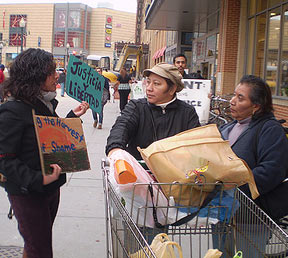 |
|
Above, Fair Food activists in Washington, DC, talk with shoppers outside of a local Giant supermarket during last Thanksgiving’s “Stop and Drop” week of action.
|
NESRI Director Cathy Albisa says Ahold, “dragging its feet on farmworker justice in its supply chain and attempting to co-opt the good name of (the CIW) to cover its tracks”…
In a scalding statement to the press released this past week, the New York-based National Economic and Social Rights Institute (NESRI), strongly rebuked supermarket giant Ahold (owner of Stop & Shop and Giant) for its refusal to join with the CIW in the growing movement to protect and advance the human rights of workers in the Florida tomato industry.
Here’s the release in its entirety:
|
New York, September 1, 2010 – Ahold, a Royal Dutch company that owns supermarkets throughout the United States and Europe, is “dragging its feet on farmworker justice in its supply chain and attempting to co-opt the good name of a leading human rights organization, the Coalition of Immokalee Workers (CIW), to cover its tracks,” says Cathy Albisa, Executive Director of the New York-based National Economic and Social Rights Initiative (NESRI). Since 2007, the CIW has urged Ahold to sign an agreement to improve wages and working conditions for farmworkers in its tomato supply chain. The agreement would require Ahold to:
To date, nine other major retail food corporations — including McDonalds, Burger King, Whole Foods, and Sodexo – have signed similar “Fair Food” agreements with the CIW. In the past year, the CIW’s campaign has won the active support of several Dutch unions, faith groups and NGOs. Adding fuel to the CIW’s campaign, consumers allied with the CIW discovered earlier this year that Ahold was selling tomatoes from Six L’s, an Immokalee-based grower associated with the most recent slavery prosecution to emerge from Florida’s fields. Florida has been called “ground zero for modern-day slavery” by federal prosecutors. But rather than join forces with the CIW to combat farm labor abuse in its supply chain, Ahold instead has chosen to respond to the growing public pressure with stalling tactics, launching an open-ended, ill-defined “investigation” of its Florida-based tomato suppliers and suspending all tomato purchases from the “Immokalee region” for the duration of the investigation. To buttress its effort to stonewall the campaign, Ahold has created the misleading impression that the CIW is somehow a genuine partner in this investigation, stating on its website that the company has “met and spoken with Coalition representatives,” and that “Ahold is gathering information from a number of sources including the Coalition of Immokalee Workers.” In light of Ahold’s tactics, NESRI believes it is important to set the record straight:
NESRI’s Albisa concludes, “Ahold must engage in socially responsible purchasing of tomatoes produced by growers that ensure basic human rights for farmworkers, and genuinely improve conditions in the fields — not simply declare an all-out purchasing ban on the region.” Albisa continues, “The time for public relations games is over. Instead, Ahold must join the Campaign for Fair Food, sign an agreement with the CIW, and prove that it is serious about farmworkers’ labor rights.” ##### |
Check back soon for more breaking news from the Campaign for Fair Food!

